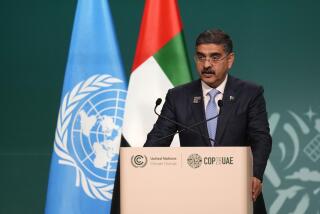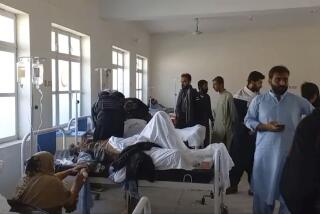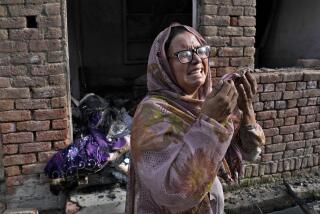Musharraf defends raid on mosque
- Share via
ISLAMABAD, PAKISTAN — President Pervez Musharraf, in his first public comments since troops stormed a radical mosque in the heart of the capital, on Thursday defended the government’s decision to use force and vowed to fight Islamic extremists “in every corner” of Pakistan.
Hours before Musharraf’s nationally televised address, the mosque’s leader, Abdul Aziz, offered a fiery funeral oration for his brother, a fellow cleric who was killed along with dozens of others in the two-day assault this week on the Lal Masjid, or Red Mosque, by elite commandos.
“God willing, Pakistan will soon have an Islamic revolution,” said Aziz, who was escorted by police commandos to the funeral of his brother, Abdul Rashid Ghazi, in the family’s ancestral village of Basti Abdullah in Punjab province.
“The blood of martyrs will bear fruit,” declared Aziz, who was held days before the assault while trying to flee the mosque dressed in a burka, a head-to-toe covering worn by women.
The mosque raid and its aftermath have highlighted how deeply divided Pakistanis remain over the role of radical Islam in their society. People generally favored the mosque assault, launched after many calls for those inside to surrender, but at the same time, the Islamists’ conservative views on many political and cultural issues are shared by a significant portion of the population.
In his address, however, Musharraf, who is also the military chief, denounced the Red Mosque leaders, saying they went against Islamic teachings.
“What do we as a nation want?” the president asked. “What kind of Islam do these people represent?”
“Terror and extremism have not ended in Pakistan,” he said. “But it is our resolve to eliminate them.... Extremism and terrorism will be defeated in every corner of the country.”
Pakistan was on high alert as Islamic militants vowed to exact vengeance for the mosque raid. In the latest of a string of deadly attacks in the region along the Afghan border, a suicide bomber Thursday killed two government officials in North Waziristan and a suicide car bomber killed three policemen in another tribal area.
In Islamabad, Pakistani officials took journalists on a tour of the ruined 2-acre mosque complex, providing a close look at the aftermath of more than 36 hours of fierce room-to-room combat that ended Wednesday. Walls were blackened and bullet-pocked; heaps of rubble still smoldered, and the ground was littered with spent ammunition and shattered glass.
Authorities were clearly eager to show the extent to which militants had turned the holy site into an armed fortress.
They displayed weapons caches -- including machine guns, mines, makeshift firebombs and rocket-propelled grenades -- and pointed out bunkers and snipers’ nests set up throughout the maze-like complex. Militant loyalists staged at least two suicide bombings in the course of the assault, army spokesman Maj. Gen. Waheed Arshad told reporters.
Even a full 24 hours after the confrontation’s end, the number of deaths and the manner in which they occurred were being hotly disputed. The government put the death toll at 108 and said about two-thirds were killed during the two-day assault and the rest in the week leading up to it.
Leaders of hard-line religious parties put the toll far higher, saying at least 400 people were killed, but they were unable to substantiate their assertions.
The government said it knew of no women or children killed during the storming of the mosque, but it acknowledged that nearly 20 bodies found inside were so badly burned that their age or gender had not been determined. About 1,300 people, including dozens of women and children, fled the complex, which included two seminaries, one each for men and women, in the two days before the assault.
In the cases of many men and boys killed in the storming of the complex, it was difficult to determine whether they had joined the ranks of the militants or were being held against their will.
In the months leading up to the Red Mosque siege, the cleric brothers had orchestrated a vigilante campaign in the capital by students, many of them female, to root out prostitution and the sale of music and videos, which they regarded as vices.
In his speech, Musharraf pledged that religious institutions such as madrasas, or seminaries, would not be allowed to serve as breeding grounds for extremism.
“We will never allow any madrasa or mosque to be misused like the Red Mosque,” he said.
Over the last five years, however, the Pakistani leader has been criticized at home and abroad for not living up to promises to reform the country’s network of thousands of madrasas, apparently fearful of a backlash from religious hard-liners.
Musharraf also vowed Thursday to bolster security forces along the border with Afghanistan in coming months, saying they would be given heavy weapons, including tanks.
New reports this week by U.S. counter-terrorism officials said the threat from resurgent Al Qaeda and Taliban elements in the tribal borderlands was at its highest level since the period just before the Sept. 11 attacks, despite pledges from Musharraf to rein in militants taking sanctuary there.
Musharraf praised the security forces for showing restraint and courage in the mosque assault, in which 10 soldiers died.
In his speech, he said sending troops to battle compatriots had been a painful step.
“Unfortunately, we have been pitted against our own people,” he said. “They had strayed from the correct path and become susceptible to terrorism.”
--
Special correspondent Zaidi reported from Islamabad and Times staff writer King from Istanbul, Turkey. Special correspondent Zulfiqar Ali in Peshawar, Pakistan, contributed to this report.
More to Read
Sign up for Essential California
The most important California stories and recommendations in your inbox every morning.
You may occasionally receive promotional content from the Los Angeles Times.










